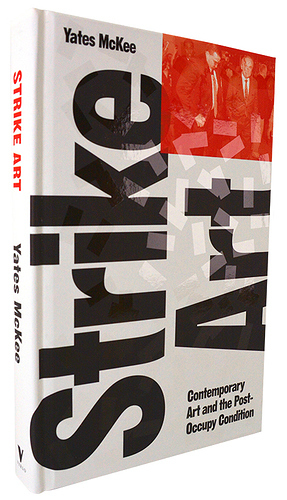@e_flux wrote:
Continuing the discussion from STRIKE ART, Question 2: Let's talk about Yates McKee's 2016 book on art, activism & Occupy:
![]()
Strike Art: Contemporary Art and the Post-Occupy Condition
by Yates McKee, London & NYC: Verso Books, 2016(Read a snapshot of the book here: STRIKE ART EXCERPT)
Question 3: On the ethos of radical scholarship
Yates McKee writes that the most rigorous approach to the study of contemporary art is one that “takes it [critical contemporary art] as an object of critical analysis concerning the meaning of contemporaneity and art alike,” adding that “the discourse of the contemporary, as it might be called, pertains to a highly specialized sector of the contemporary art system that exists in close proximity to academia and identifies itself as a self-consciously left-wing endeavor” (10–11). And yet, writing as a cultural critic and artist who is informed by Marxism as much as by contemporary art, I have to ask if we “radical artists and scholars” are not first obliged to cast a critical eye on the specialized cultural and academic categories bourgeois society has developed, including even “Leftist” art shibboleths such as institutional critique and social practice art? In other words, what sort of accountability exists, as Strike Art proposes, from us towards the specialized discipline of contemporary art given that it is a field that both constructs us and that we in turn reproduce? What equal or perhaps greater obligation do we have towards the liberation of a general creativity, something along the lines Marx proposed in 1845 in which we fish in the afternoon, rear cattle in the evening, criticize after dinner, (and make paintings all night long?) Or, in the short term at least, should we not be seeking out a potentially different radical hermeneutic, one that critically address the antimonies of culture under neoliberal capitalism, no matter where that excursion might take us?
BACKGROUND TO QUESTION:
Too often we find not only traditional art historians, but also those claiming to embrace a radical or Marxist political outlook blindly reproducing the status-quo by uncritically focusing on the familiar canon and methodologies of the mainstream art world system. How easy it is to dismiss, for example, the cultural activities of an urban squatter space for instance, or the kitschy craft of an eccentric amateur artist. And yet if Thomas Hirshhorn generates a makeshift squatter-like community or Jeff Koons produces sculpture that looks like an enlarged flea-market tchotchke, these are often celebrated as subversive cultural practices. Where has the spirit gone in which all of bourgeois culture, from top to bottom, including its forms and institutions, is dragged out onto the dissecting table of ideological critique?
Despite their many differences in method and outlook, books such as Strike Art (and yes Adeola, sadly mostly written by men who are "white"), as well as Seeing Power (Thompson), The Composition of Movements to Come (Shukaitis), Revolutionary Time (Roberts), Artificial Hells (Bishop), What We Made (Finkelpearl), Social Works (Jackson), T*oward a Lexicon of Usership* (Wright), Occupation Culture and Art Gangs (A. Moore), Art and Revolution (Raunig), Streetopia (Solnit, Kraus, Schulman, Lyle), In The Flow (Groys), Disobedient Objects (Flood & Grindon, ed.), Global Activism (Weibel, ed.), Art and Social Change: A Critical Reader (Esche and Bradley ed.), Art & Activism in the Age of Globalization (De Cautier, De Roo, Vanhaesebrouck ed.), and my own book Dark Matter collectively converge around the certainty that the object of artistic interest and study has fundamentally changed in recent years. Add to this the fact that so many major specialized cultural institutions are also undergoing an extraordinary transformation in which global capital, precarious labor, and high culture unite. It's as if contemporary art itself has entered into, or stumbled upon, an unarticulated détente with neoliberal capitalism.
Certainly, institutional survival in these difficult times is a real, pragmatic issue. However, this phenomenon of complicity between art and capital has come to resemble outright opportunism. It is a situation we sadly see at work with the Louvre, British Museum, and Guggenheim Abu Dhabi on Saadiyat Island in the UAE. In fact, just a few days ago, on the morning of April 13th, the administration of the Guggenheim Museum informed Gulf Labor Coalition that after six years of negotiations and protest over labor conditions in the UAE they, the Museum, would no longer have anything to do with the artists' group. The upshot leaves one powerful impression: that the mainstream art world's overture towards progressive politics and social justice is, at the end of the day, merely a question of expediency. Under such circumstances should we not ask what is this thing called contemporary art? And also, what if any debt do we owe it?
Which leaves us where exactly?
I would propose that before proceeding with any analysis of contemporary art we first need to challenge not only the institutions of high culture, but also the inherited categories of cultural scholarship that inevitably support art world attitudes including conventional modes of criticism, canonization, judgement, as well as all the tacit determinants that regulate the proper object of artistic study (which might alternatively be described as the implicit property rights wielded by those with the greatest accumulation of cultural capital such as the Guggenheim Museum).
In other words, do we not need to explore a different set of laws and criteria and perhaps even hermeneutics appropriate to a different species of 21st Century artistic object/action/thing/practice? And doesn't doing otherwise risk reinforcing the very species of entrenched “expert culture” that Occupy was determined to reject, if not completely supersede? (Strike Art 71, 105)
Posts: 2
Participants: 1
